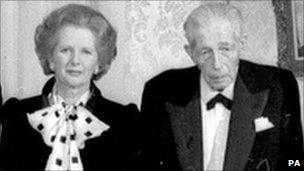Thatcher 'lectured by Macmillan' over economic policies
- Published

Harold Macmillan sent Margaret Thatcher an 11-page document with his opinions on the economy
Margaret Thatcher was advised by Harold Macmillan to drop her controversial economic policies a year after she became prime minister.
Her predecessor's warning was revealed in files released by the National Archives under the 30-year rule.
The former Conservative prime minister warned that the austerity measures could lead to high unemployment, social conflict and industrial collapse.
Cuts were leading the nation towards dangerous unemployment levels, he said.
Mrs Thatcher was under pressure in 1980 for her "monetarist" economic policies.
The theory was that if the government restricted the money supply, then inflation would be forced down.
Consensus praised
But Mr Macmillan warned against her programme of cuts in an 11-page memorandum.
He appealed to her to return to the "consensus politics" that was characteristic of previous Conservative governments.
"The so-called 'money supply' policy may be useful as a guide to what is happening just as a speedometer is in a car, but like a speedometer it cannot make the machine go faster or slower," he wrote in his memorandum.
He also said government policies, combined with high interest rates - "which would have been regarded as sheer usury in any other age" - were undermining the competitiveness of British exporters.
Not only that, but they were not having any significant effect on inflation.
"What then can said to have been gained?" he wrote.
"Certainly a shock has been given by the government's policies to the nation as a whole, and even a sense of exhilaration amongst those who believe that steady continuance of these deflationary policies will achieve the desired result."
'Divisive politics'
According to Macmillan, the main pressure was falling on private enterprise.
"The high value of the pound, the excessive interest rates, the postponement of capital investment by the central government, local governments and industry are together threatening not merely an alarming increase of unemployment (which so far as it is a result of reducing over-manning may be healthy economically, although dangerous socially)," he wrote.
"But in due course it threatens a serious blow to the balance of payments through the collapse of certain important industries."
Macmillan ended his writings with a warning that such controversial measures could not be sustained indefinitely.
He also appealed for "a return to 'consensus' politics, sneered at by some, but the essence of Tory democracy".
He added: "Divisive politics in a democratic system are not likely to be applied for sufficient length of time to become effective even if such methods were desirable."
Television interview
The BBC's Sanchia Berg has seen private papers belonging to Mrs Thatcher, which are now held at the Margaret Thatcher Foundation, based at Churchill College, Cambridge.
Mrs Thatcher's private copy of the memo is annotated with arrows and underlinings in two different colours, suggesting she read it more than once, our correspondent added.
However, Mrs Thatcher was not dissuaded from her chosen course of economic action.
In the autumn of the same year, she made a now-famous speech at the Tory party conference in which she announced "the lady's not for turning".
After that speech was made, Macmillan went public with his concerns, using a lengthy prime-time television interview to say the government had its economic policy the wrong way around, and warned about dire industrial strife.